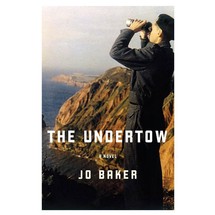The Undertow
By Jo Baker
352 pages;
Knopf Doubleday
What is the legacy of four generations of loss? For Americans without a direct link to the current conflicts overseas or who get their war news from TV and Twitter, the question can seem like a distant concept. Oddly enough, however, this tightly crafted English novel, tracing a family from World War I to Iraq, brings it to life. Jo Baker's story begins with William, a young factory worker, on the eve of the Battle of Gallipoli, and then skips forward in time to his now-adult son, Billy, who serves on D-Day. The action, though, focuses less on the battlefield and more on the parallel lives of their two families—the everyday hunger (when the men go missing, so does the paycheck), the undiscussed loneliness and extramarital affairs, the overwhelming desire of wives for something both as mundane and luxurious as a tube of red lipstick. In the '50s, Billy's son, Will, grows up in the peacetime and succeeds as an academic at Oxford, only to fail as a husband due to his penchant for coeds. "You know what your problem is, boy?" says his now elderly father. "You never had a war to go to." Out of context, this may sound like a callous comment, but considering the layered perspectives throughout the narrative, which include everyone from mothers-in-law talking to the ghosts of their dead husbands to an 8-year-old boy aching for the love of his father, but unable to get it, it reflects what has been handed down in this family—grief and silence and private forbearing, as long-past violence stains every present-day interaction. Hope arrives at the end of the novel with Billie—a daughter named after the preceding William, Billy and Will—an artist who is unable to keep her little half brother from volunteering in Iraq. While in Malta (the last place her great-grandfather was seen alive, though she doesn't know it), looking at a painting of the beheading of Saint John the Baptist, she says about the dying man on the canvas (and perhaps about the difficult, defining moments in all our lives): "You can't switch it off. You can't walk away. You have to look."
— Leigh Newman


